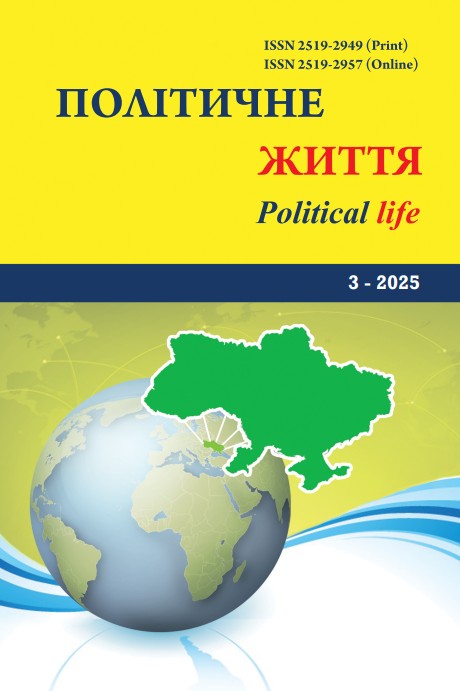Ідентифікація політико-правових мехнізмів інформаційної безпеки держави в умовах гібридної війни
DOI:
https://doi.org/10.31558/2519-2949.2025.3.15Ключові слова:
інформаційна політика, політико-правові механізми, гібридна війна, інформаційна безпека, стратегічні комунікації, дезінформація, нормативно-правове регулюванняАнотація
У статті здійснено комплексне дослідження політико-правових механізмів інформаційної політики держави в умовах гібридної війни. Показано, що інформаційна політика України розвивається в контексті поєднання правових норм, стратегічних документів та інституційних практик, спрямованих на протидію інформаційним загрозам. У роботі: ідентифіковано ключові теоретико-концептуальні засади дослідження інформаційної політики та її зв’язку з категоріями інформаційної безпеки й гібридної війни; проаналізовано нормативно-правову базу України (Конституція, закони, укази Президента, стратегії), а також міжнародні стандарти (DSA, EDAP, Кодекс практик проти дезінформації, документи НАТО StratCom COE та ЄС); визначено інституційно-організаційні механізми, серед яких діяльність РНБО, Міністерства культури та інформаційної політики, Центру протидії дезінформації, а також роль громадянського суспільства та міжнародних партнерів; систематизовано політико-правові інструменти: «жорсткі» (санкції, блокування ресурсів, регулювання медіа) та «м’які» (стратегічні комунікації, інформаційні кампанії, фактчекінг); сформульовано перспективи та рекомендації щодо вдосконалення інформаційної політики: гармонізація законодавства з європейськими стандартами, створення єдиної координаційної структури, розвиток суспільної стійкості та інтеграція в євроатлантичний безпековий простір. З’ясовано, що ефективність інформаційної політики держави у протидії гібридним загрозам можлива лише за умови синергії політико-правових норм, інституційної координації та стратегічних комунікацій. Загалом, політико-правові механізми інформаційної політики в умовах гібридної війни повинні функціонувати як система взаємодії права, інституцій та стратегічних комунікацій, що дозволить державі не лише протистояти загрозам, але й формувати власний позитивний інформаційний простір.
Посилання
Компанцева Л. Доктрина інформаційної безпеки України: теоретико-правові засади. Інформація і право, Київ: Науково-дослідний інститут інформатики і права.2017. № 3(22). С. 5–12.
Hoffman, F. G. (2007). Conflict in the 21st Century: The Rise of Hybrid Wars. Arlington, VA: Potomac Institute for Policy Studies, 72 p.
Антипова А. Стратегічні комунікації як складова інформаційної безпеки держави. Юридичний часопис Національної академії внутрішніх справ. Київ: Національна академія внутрішніх справ.2023. № 13(1). С. 44–52.
Зернецька О. Глобальний розвиток комунікацій: інформаційна політика та міжнародні відносини. Київ: Видавництво «Києво-Могилянська академія». 2011. 368 с.
Hoskins, A., & O’Loughlin, B. (2010). War and media: The emergence of diffused war. Cambridge: Polity Press, 225 p.
NATO Strategic Communications Centre of Excellence (StratCom COE). (2016). Russian information campaign against Ukrainian state and defence forces: Framing of the Ukraine–Russia conflict in online and social media. Riga: NATO StratCom COE, 108 p.
NATO Strategic Communications Centre of Excellence (StratCom COE). (2024). War on all fronts: How the Kremlin’s media ecosystem broadcasts the war in Ukraine. Riga: NATO StratCom COE, 146 p.
McQuail, D. (2010). McQuail’s Mass Communication Theory (6th ed.). London: Sage Publications, 621 p.
Закон України «Про національну безпеку України» від 21 червня 2018 року № 2469-VIII. Відомості Верховної Ради України, № 31. URL: https://zakon.rada.gov.ua/laws/show/2469-19#Text
Castells, M. (2009). Communication power. Oxford: Oxford University Press, 571 p.
Грищенко К. Гібридна війна: виклики та загрози для інформаційної безпеки України. Науковий вісник Національного університету «Острозька академія». Серія «Політологія». Острог: НаУОА. 2020. № 2(12). С. 15–23.
Конституція України (1996, ред. 2024 р.). Відомості Верховної Ради України, № 30, ст. 141. URL: https://zakon.rada.gov.ua/go/254%D0%BA/96-%D0%B2%D1%80
Закон України «Про інформацію» від 2 жовтня 1992 року № 2657-XII (ред. 2024 р.). Відомості Верховної Ради України, № 48. URL: https://zakon.rada.gov.ua/laws/show/2657-12#Text
Закон України «Про медіа» від 13 грудня 2022 року № 2849-IX. Відомості Верховної Ради України, № 4, 2023. URL: https://zakon.rada.gov.ua/laws/show/2849-20#Text
Закон України «Про національну безпеку» від 21.06.2018 № 2469-VIII (чинна редакція станом на 21.08.2025). Офіційний портал Верховної Ради України. URL:https://zakon.rada.gov.ua
Указ Президента України № 47/2017 «Про Доктрину інформаційної безпеки України». Офіційний вісник Президента України. URL: https://www.president.gov.ua/documents/472017-21374
Указ Президента України № 44/2021 «Про Стратегію кібербезпеки України». Офіційний вісник Президента України. URL: https://www.president.gov.ua/documents/442021-36441
Указ Президента України № 106/2021 «Про створення Центру протидії дезінформації». Офіційний вісник Президента України. URL: https://www.president.gov.ua/documents/1062021-37533
Стратегія національної безпеки України. Указ Президента України від 14.09.2020 № 392/2020. URL: https://zakon.rada.gov.ua/go/392/2020
European Commission. (2022). Digital Services Act: Regulation (EU) 2022/2065. Brussels: Publications Office of the European Union, 152 p.
European Commission. (2020). European Democracy Action Plan. Brussels: Publications Office of the European Union, 24 p.
European Commission. (2022). Code of Practice on Disinformation (Strengthened 2022). Brussels: Publications Office of the European Union, 32 p.

